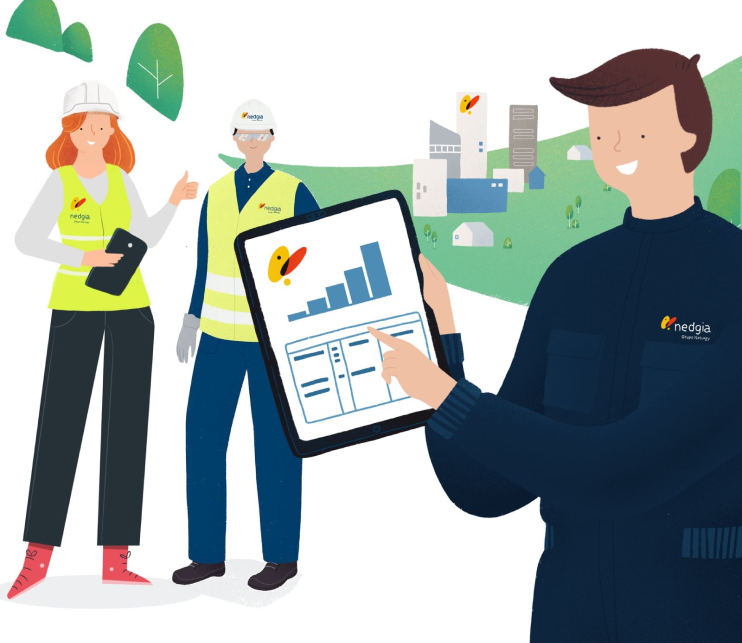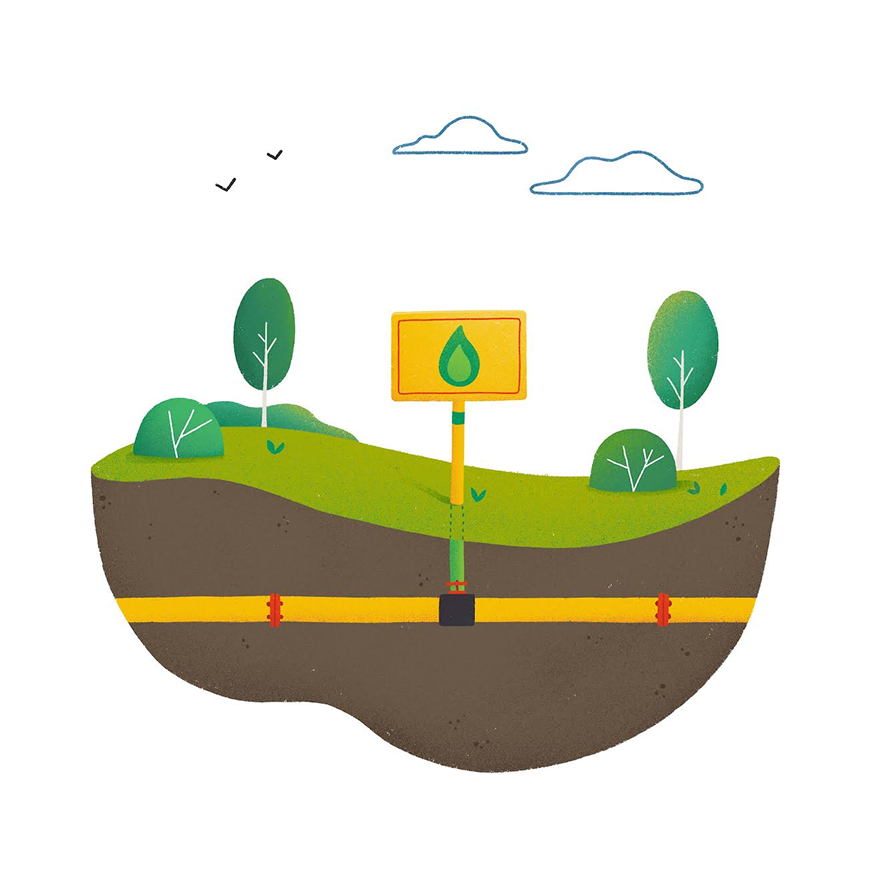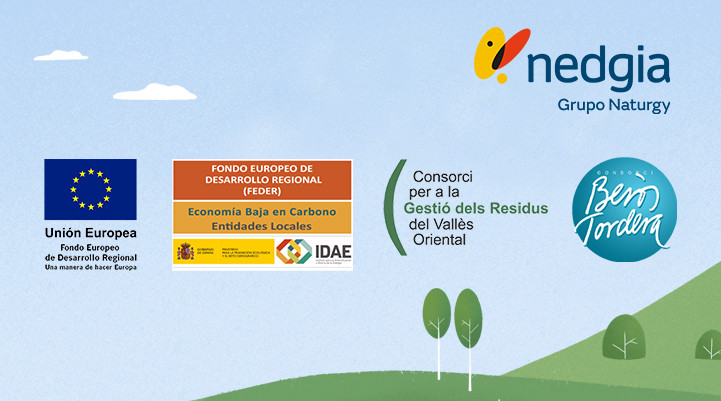The facility, driven by the Consorci per a la Gestió dels Residus del Vallès Oriental and the Consorci Besòs Tordera, produces biomethane from the management of 55,000 tonnes of organic waste and the treatment of 12 million m3 of wastewater per year.
- The plant plans to inject 4 GWh of renewable gas annually into the Nedgia network, the gas distributor of the Naturgy group, which is equivalent to the consumption of 4,800 homes, and could reach up to 27 GWh of production per year.
- It is the sixth biomethane plant that the company has connected to its network in Spain and the first in Spain with WWTP and waste origin.
- This project, which could lead to more than 9,000 tonnes of emission reductions, allows Catalonia to continue to make significant progress in the reduction of greenhouse gases, the penetration of renewable energy and the circular economy, transforming waste into a high-value energy resource.
Nedgia, the gas distributor of the Naturgy group, has begun injecting renewable gas into its network via the BioVO project, which generates biomethane from organic waste and sludge extracted from wastewater in the municipality of Granollers (Barcelona).
The BioVO project is backed by the Consorci per a la Gestió dels Residus del Vallès Oriental and the Consorci Besòs Tordera, with the Facsa-Transparenta joint venture as the company awarded the contract for the design, construction and operation, as well as the operation of the WWTP. It will produce 4 GWh of biomethane per year, equivalent to the consumption of 4,800 homes, and will prevent the emission of 1,472 tonnes of CO2 into the atmosphere per year. The plant could increase this figure to 27 GWh, which would reduce CO2 emissions by up to 9,700 tonnes.
This biomethane is obtained from the management of 55,000 tonnes of organic waste per year from the Anaerobic Digestion and Composting Plant of the Consorci per a la Gestió del Residus del Vallès Oriental. The waste treated will be increased to 80,000 tonnes when the first phase of the Anaerobic Digestion Plant expansion is completed and will reach 100,000 tonnes in a second phase. The renewable gas also comes from the biogas generated through the treatment of sludge extracted during the purification processes of the 12 million m3 of wastewater treated annually by the Granollers Wastewater Treatment Plant (WWTP).
Raúl Suárez, CEO of Nedgia, said that "this project is the sixth project that Nedgia has connected to its network in Spain and represents the paradigm of public-private collaboration for the development of renewable gases". "At Nedgia we continue to make progress to harness the high potential of our country, the third largest in Europe, and the opportunities that are emerging throughout the territory for renewable gases to contribute to decarbonisation," added Suárez.
Pere Rodríguez, president of the Consorci del Vallès Oriental, stressed that "we believe that the energy transition must also reach society through actions led by public administrations. BioVO is a clear example of this and a clear territorial commitment to the development of renewables and decarbonisation. This plant will allow us to reduce the carbon footprint of the two facilities and collaborate with the development of the circular economy by optimising the energy use of resources generated by the Anaerobic Digestion and Composting Plant and the Wastewater Treatment Plant".
Òscar Sierra, president of the Consorci Besòs Tordera, stated that "BioVO represents the consolidation of a common objective of two local public administrations towards the energy neutrality of their processes. The conversion in BioVO of the biogas produced in both facilities into biomethane and its subsequent injection into the gas network offers citizens the chance to use renewable gas directly in their homes or industries, complementing the energy use that this type of sanitation and waste treatment facilities already make of the biogas produced in their own processes".
For his part, Francesc Roca, manager of the Facsa-Transparenta joint venture, said that "the project is a real example of circular economy and public-private collaboration, where the involvement of multiple actors has been essential to overcome the high complexity, both technical and administrative, of the project. On the other hand, as operators of the treatment plant we achieve a significant reduction in the carbon footprint of the plant, due to the high efficiency of the process".
Nedgia's contribution to the decarbonisation of the sector
With the implementation of this project, Nedgia guarantees another 4 GWh/year of biomethane are injected into the grid (which could be increased to 27 GWh/year), thus contributing to the penetration of renewable gas through its infrastructure. With this plant, the Naturgy group gas distributor reaches, the significant milestone of six biomethane generation facilities connected to its network, four of them located in Catalonia, with a combined injection capacity of 142 GWh/year.
The Elena facility, located in Cerdanyola del Vallès (Barcelona), was the first to inject renewable gas from landfill into the Spanish gas distribution network. It was followed by Biogasnalia, in Burgos, with agricultural and industrial waste. In Lleida, it has connected the Torre Santamaría farm, which injects biomethane from livestock waste, and in A Coruña, Edar de Bens, which supplies biomethane from wastewater. Recently, the company has also started to inject biomethane produced from urban waste from the Can Mata controlled deposit in Els Hostalets de Pierola.
BioVO Project
The aim of this project is to generate biomethane by using the biogas generated in the treatment processes at the Anaerobic Digestion and Composting Plant of the Consorci per a la Gestió dels Residus del Vallès Oriental and at the Granollers Wastewater Treatment Plant (WWTP) of the Consorci Besòs Tordera.
The facility has a biogas cleaning and purification plant, using Bright Renewables membrane technology; a gasometer with a capacity of 1,250 m3 and a module for biomethane injection into the Nedgia network. The project uses biogas from the WWTP facilities and the organic waste management plant from selective collection, now estimated at 661,036 Nm3/year and which could reach 3.26 million Nm3/year.
With a planned cost of 2,775,000 euros, the project has received a grant of 1,012,944.76 euros from the Institute for Energy Diversification and Saving (IDAE) through the EU European Regional Development Funds (ERDF) as it is an initiative that favours a low-carbon economy and, therefore, sustainable growth. The remainder will be paid for by the two consortia.
An opportunity for Catalonia
Catalonia is the fifth autonomous region with the highest potential for biomethane production, more than 8% of the total in Spain, enough to decarbonise all domestic-commercial consumption in the region, and ranks third in potential biomethane production from wastewater waste.
According to a recent report by consultancy firm Biovic and PWC for Sedigas, developing the full biomethane potential in Catalonia would involve the construction of 248 plants and a total investment of €3.616 billion between plants and networks, which would contribute significantly to local job creation.
In this regard, it should be noted that this project has the backing of Biovic, which specialises in the engineering, execution and commissioning of biogas, biomethane and green hydrogen plants, as well as environmental, waste recovery and renewable energy consultancy.
About Nedgia
Nedgia, the Naturgy group gas distributor, is the leading company for natural gas distribution in Spain, where it operates in 11 autonomous regions and 1,150 municipalities. It has over 5.4 million supply points, representing 70% of consumers. Its main assets are its 57,000 kilometres of networks that enable safe and efficient supply of natural gas and renewable gas (biomethane), as well as hydrogen going forward. Innovation, proximity and customer service are part of its raison d'être, and define its activity. Nedgia remains firmly committed to renewable gases and their incorporation in gas system infrastructure. The company has six biomethane plants in operation, injecting into its infrastructure network, and an additional portfolio of around 200 projects in different stages of development that will enable it to incorporate new production of this renewable gas in the short and medium terms in Spain, the country with the third greatest potential for biomethane production in Europe.
About the Consorci per a la Gestió dels Residus del Vallès Oriental
In 1998, the procedure to approve and constitute the Consorci per a la Gestió dels Residus del Vallès Oriental began with the approval of its statutes, at the request of the Regional Council and several town councils in the county, with the aim of creating, managing and providing unified services and activities of common interest in the field of waste, as well as managing, by express delegation of its members, all activities and services linked to its object and purposes, which were set out in article 1 of the statutes. The process culminated in the incorporation of the Consortium on 2 June 1998 and its subsequent registration in the Register of Local Entities of Catalonia.
During its 25 years of operation, the Consorci has focused its efforts on the creation of infrastructures: such as the anaerobic digestion and composting plant and the waste transfer plant, both in the process of expansion and improvement; the network of clean points and the current BioVO plant, to provide a response to waste management and treatment. It has also worked to support municipal selective collection policies, and to finance studies to enable the development of these policies and determine their needs. During this time, the Consorci has been committed to waste prevention and the promotion of recycling with informative and proactive campaigns aimed at citizens and has created spaces for debate and research in the field of waste.
The Consorci per a la Gestió dels Residus del Vallès Oriental works to make both its facilities and the services it provides more efficient and sustainable, promoting renewable energies and energy saving and thus contributing to the energy transition.
About Consorci del Besòs Tordera
The Consorci Besòs Tordera is a local administration with administrative nature and full legal status, which is registered in the Register of Local Entities of Catalonia, being recognised as a Local Water Entity (ELA). It is made up of 68 entities, of which 64 are municipalities in the counties of Barcelonès, Moianès, Osona, Vallès Occidental and Vallès Oriental, with a population of around 2,400,000 inhabitants. Its main lines of action are low level sanitation (municipal sewers), high level sanitation (control of discharges, collectors, pumping and wastewater treatment plants -WWTP-), improvement of the river basin environment, innovation and research, environmental promotion and education -through the RIVUS Foundation- and support for consortium members.
It currently manages 27 sewerage systems, more than 300 km of wastewater collectors and 55 pumping stations. Of the 64 municipalities, 51 have delegated their sanitation functions to the consortium, with a population served of more than 500,000 inhabitants and more than 5,000 industrial establishments connected to the sanitation network. The Consorci Besòs Tordera is working to make its facilities more sustainable and self-sufficient, with the generation and use of biogas energy at its larger WWTPs, converting waste into resources, and with the installation of photovoltaic solar panels at all its treatment plants.
About Facsa and Transparenta
Transparenta was born out of the alliance between Facsa and Calaf Grup with the aim of implementing a new way of doing things in the management of the integral water cycle in Catalonia with an innovative vision, oriented towards citizenship and sustainability. Facsa, with 150 years of experience in the management of the integral water cycle, and Calaf Grup, of Catalan origin and with a track record of more than 55 years in all types of building projects, rehabilitation, civil construction and projects linked to the water cycle, create a unique strategic tandem in the sector, which provides Transparenta with extensive experience, a deep knowledge of the territory and technical expertise.







